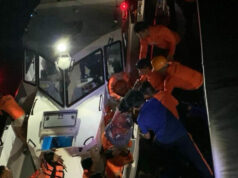BTA committee on Marawi City to hold public hearings on rehabilitation

THE BANGSAMORO Transition Authority’s Special Committee on Marawi will hold a series of public hearings starting January to put together a report intended to help improve the slow implementation of the rehabilitation plan for the city that was devastated in 2017. Amir S. Mawallil, a member of the Bangsamoro Autonomous Region in Muslim Mindanao (BARMM) Parliament, said the committee’s report will be submitted to the parliament. Among those to be invited for the hearings include members of civil society, government officials, and representatives of the internally displaced persons (IDPs). Local extremist group Maute, which has links to the Islamic State, led a siege of Marawi City on May 23, 2017. The battle with government troops lasted for five months, leaving central parts of the city in ruins.
HOUSE
At the House of Representatives, two resolutions have been filed calling for an inquiry in aid of legislation on the rehabilitation process status as well as the disbursement of funds. These are House Resolutions 377 and 470 filed by Representatives Lucy Marie Torres-Gomez (Leyte 4th District), Mujiv S. Hataman (Basilan) and Amihilda J. Sangcopan (Anak Mindanao Party-list). At a hearing of the House committee on disaster management on Dec. 18, the Marawi Reconstruction Conflict Watch (MRCW) gave a statement citing that: “The general sentiment of the Maranaos is that there is very little progress in the actual rebuilding of Marawi City. There is confusion on the ground regarding discrepancies between proposed plans and actual projects and services delivered.” MRCW is a multi-stakeholder group of professionals, experts, and network leaders that aims to help ensure that the reconstruction of Marawi City is inclusive and conflict-proof. “The lack of transparency and public accountability of the TFBM (Task Force Bangon Marawi) and relevant agencies brings uncertainty, insecurity, and frustration to the IDPs and fuels the people’s despair and anger towards the government, which makes those who suffer the most more vulnerable to the lure of extremist thinking and heightens their propensity for violence,” the group said. — MSJ



